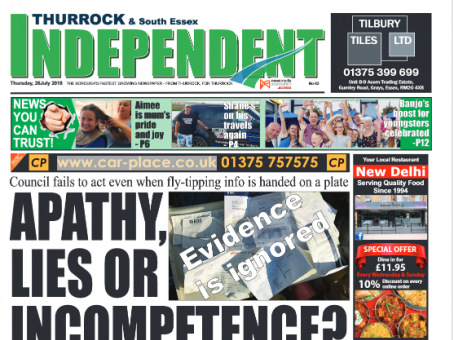
The Thurrock Independent breached privacy guidelines by showing a woman’s bank details in a video published alongside a story about fly-tipping, according to the UK’s largest press regulator.
Documents containing Jenna Cosentino’s bank and insurance information were visible in the minute-long video, which was published on the title’s website on 17 July this year.
It was headlined: “Flytip reveals origin of rubbish dumped in Chadwell that angers residents.”
Readers could see her account and credit card numbers in the video as well as outstanding balances and an address at which she had recently lived.
Consentino complained to the Independent Press Standards Organisation that the paper had breached the Editors’ Code of Practice – the standards to which all IPSO members are held – under privacy (Clause 2).
She complained that two follow-up stories breached harassment rules (Clause 3) under the code.
Thurrock Independent denied that it had breached the code and said it had decided against redacting her details on the video, which was taken by its editor, because it would affect the “authenticity” of the video.
The paper also claimed that Cosentino, who said she had used a waste disposal company to remove the rubbish, had placed the information into the public domain because it was on public land.
ISPO said the complainant “clearly had an expectation of privacy” as her bank and insurance details were “sensitive confidential information” that came from private correspondence.
IPSO’s Complaints Committee added: “The committee did not accept that using an unauthorised contractor to remove waste amounted to consent to place private information in the public domain.
“Also, while the documents were visible on public land, the newspaper had not sought to argue that this specific information was so widely known so as to constitute it being in the public domain.”
The press regulator added that it was considering further action against Thurrock Independent over the way it handled Consentino’s privacy complaint to the paper.
She claims that when she asked the paper to redact her private information, the editor said he would only do so once she agreed to speak with the police and local council about how her rubbish ended up on the public site.
IPSO said its Complaints Committee expressed “serious concern about the newspaper’s handling of the complaint”.
Consentino’s privacy complaint was upheld in relation to the first article. IPSO rejected her complaint that follow-up articles amounted to harassment under the editor’s code.
The newspaper has been ordered to publish the adjudication in full. A link to it should appear on the top half of its website homepage for 24 hours.
Email pged@pressgazette.co.uk to point out mistakes, provide story tips or send in a letter for publication on our "Letters Page" blog
